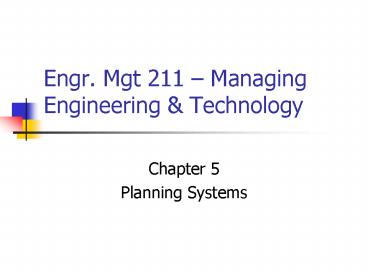Engr. Mgt 211 Managing Engineering - PowerPoint PPT Presentation
1 / 29
Title:
Engr. Mgt 211 Managing Engineering
Description:
Planning is defining organizational goals, establishing a strategy for reaching ... Retrenchment. Combination. Creating Strategies ... – PowerPoint PPT presentation
Number of Views:105
Avg rating:3.0/5.0
Title: Engr. Mgt 211 Managing Engineering
1
Engr. Mgt 211 Managing Engineering Technology
- Chapter 5
- Planning Systems
2
What is planning?
- Planning is defining organizational goals,
establishing a strategy for reaching those goals,
and developing a comprehensive hierarchy of
plans to integrate and coordinate activities.
3
Types of plans
Managers classify plans according to their
breadth (strategic vs. operational) and time
frame
- Strategic vs Operational
- Establish overall objectives
- Specify details of how objectives are achieved
- Short, Intermediate and Long-term
4
Strategic Verses Operational plans
1. Upper-level managers develop strategic plans
that apply to the entire organization, establish
overall objective, and position the organization
within its environment
5
Strategic Verses Operational plans
2. Lower-level managers focus on operational
plans that specify how the overall objectives
will be achieved. These plans differ in time
frame and scope
6
Strategic Verses Operational plans
3. Operational plans are limited in scope and are
measured daily, weekly or monthly strategic
plans are broader, less specific and encompass
five or more years
7
Short, Intermediate, and Long Term Plans
- The short-term covers less than one year
- 2) Intermediate-term covers one to five years
- 3) The long term normally covers five or more
years
8
Planning in an Uncertain Environment
- Why managers plan?
- Planning gives direction
- Reduces impact of change
- Minimizes waste and redundancy
- Sets standards for control
9
Planning in an Uncertain Environment
- Formalized and strategic planning is popular in
business, but critics have observed the
following - Planning creates too much rigidity
- You cant plan for change in a turbulent
environment - Systems cant replace intuition and creativity
- Planning focuses to much on todays environment
- Organizations may become preoccupied with factors
responsible for current success
10
Planning in an Uncertain Environment
- The bottom line Does planning improve
organizational performance ?
11
Does Planning Improve Performance?
- Financial results
- Contingency planning
- Quality and implementation
- Insight and creativity
- Environmental concerns
12
Defining Organizations Purpose
- Mission Statements defines organizations
purpose and provides guidance to managers and
employees. Answers such questions as - What business are we in?
- What are we trying to accomplish?
- Focuses an organizations strengths into a
competitive advantage
13
Creating Strategies
- Types of Strategies
- Growth
- Stability
- Retrenchment
- Combination
14
Creating Strategies
- SWOT Analysis (Strengths, Weaknesses,
Opportunities, Threats) - Identify external opportunities and threats
- Identify organizations strengths and weaknesses
- Choose a niche
15
(No Transcript)
16
Strategic Framework
- Michael Porter asserts that no firm can be all
things to all people ( so dont try) - Competitive advantage
- Capability or circumstance that gives an
organization an edge over its rivals - Cost leadership strategy
- Differentiation strategy
- Focus strategy
17
Implementing a Strategy7 S Model
- Strategy
- Super-ordinate goals
- Skills
- Structure
- Systems
- Style
- Staff
18
Implementing a Strategy
Structure
Systems
Strategy
Superordinate Goals
Style
Skills
Staff
19
Importance of Sustaining a Competitive Advantage
- Long-term success requires that the strategy be
sustainable despite changing technology, fickle
customers, and increasing competition
20
Sustaining a Competitive Advantage
- Project Management
- Entrepreneurship
- Multiple Objectives
- Effective Time Management
21
Project Management
- Getting the activities done on time, within
budget, and according to specifications - Project Planning Process
- Objectives, activities and resources, establish
sequencing, time estimate, project completion
time, compare objectives, determine resource
requirements - Role of Project Manager
22
Entrepreneurship
- Process by which individuals pursue
opportunities, fulfilling needs and wants through
innovation, without regard to the resources they
currently control
23
Are You an Entrepreneurial Type?
- Entrepreneurial personality
- High need for achievement, strong belief that you
control your destiny and desire to take moderate
risks - Not contented in typical large corporations
- Challenges of starting own business mesh well
with personality
24
How Entrepreneurs and Traditional Managers Differ
- The entrepreneurs strategy is driven by
perceived opportunity rather then available
resources - Only after identifying an opportunity and
developing a plan for exploiting it does he or
she worry about resources
25
Objectives Use Misuse
- Objectives or goals refer to desired outcomes for
individuals, groups or entire organization - Organizations have Multiple objectives
- Real vs Stated Objectives
- Value of Objectives Goal setting theory
26
Management by Objectives
- Identify key tasks
- Establish specific and challenging goals
- Specify deadline
- Have employee actively participate
- Prioritize goals
- Rate goals
- Build in feedback mechanisms
- Line rewards to goal attainment
27
The Downside of Objectives
- Goal setting should be on-going, and goals should
be regularly reviewed and updated. In addition,
individuals should be rewarded for setting
difficult goals, even if they are not fully
achieved.
28
Time Management Skills
- Time is a scarce resource
- Response time vs discretionary time
- Analyze how time is spent
- Very important, important, not so important,
unimportant - Very urgent, urgent, not urgent, time not a factor
29
Effective Time Management Skills
- Five steps list objectives, rank objectives,
list activities needed, assign priorities,
schedule accordingly - 10-90 principle
- Know productivity cycle
- Parkinsons law
- Group less important activities
- Minimize disruptions































